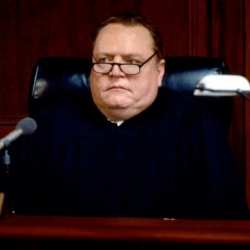Larry Flynt has filed a lawsuit against the state of California. The lawsuit challenged California gambling laws which prevent state residents who own cardroom licenses from investing in out-of-state casino operations.
Larry Flynt is famous (or infamous) for publishing the pornographic magazine, Hustler, since 1974. What is less well known about Mr. Flynt is his ownership of two California cardrooms, The Hustler Casino and LuckyLady Casino in Gardenia.
The publisher is also famous for his many legal battles over the years. He has appeared before the US Supreme Court, where he won a 1st Amendment battle against a nationally-known religious figure. That legal victory ended with a 8-0 repudiation of Rev. Jerry Falwell by the Supreme Court.
That is by no means the only litigation Larry Flynt has won. In many ways, the current case appears to be one where Flynt and his allies are applying pressure to the California legislature through its court system. Many officials believe the law being attacked by the self-described “scumbag” is antiquated and should be removed.
Nevada, Mississippi, Colorado Casinos
The publisher wants to invest in out-of-state casinos, but he is barred from doing so by California laws. Reports suggest that Larry Flynt wants to invest in casinos in Las Vegas, Mississippi, and Colorado.
The lawsuit involves two other cardrooms, and it accuses California laws for discrimination. Those names in the suit are the California Gambling Control Commission and the California Department of Justice.
Kamala Harris, who currently serves as the California Attorney General, but takes over in January as a US Senator from California, also is named in the suit, because she is the director of the California Justice Department.
Haig Kelegian Joins Gaming Lawsuit
Two other California casino owners have joined Larry Flynt in his lawsuit: Haig Kelegian Sr. and Haig Kelegian Jr. The younger Mr. Kelegian owns 3 poker rooms in California, and also has a history of being fined and punished for violation state gambling laws.
The three plaintiffs allege that the gambling law is archaic and needs to be changed. The plaintiffs allege that Section 19858 (known as the “Gambling Enforcement Act“) was added to the state gambling laws in order to prevent organized crime members who owned poker rooms from manipulating the casino industry.
No Punitive Damages Required
The lawsuit is not seeking punitive damages from the state. Instead, the plaintiffs want the state of California to stop enforcing the Gambling Enforcement Act. Presumably, the state’s lawmakers eventually would eliminate Section 19858 from the gaming code.
In a 25-page legal brief attached to the lawsuit, the plaintiffs cite a “Little Hoover” Commission report in 2002 which stated that Section 19858 is no longer necessary to protect the public. The California Little Hoover Commission, which was established in 1962, is respected for its investigations into state government operations, in the hopes of promoting better efficiency in government.
Quote from the Flynt Legal Brief
The legal brief states in the recent lawsuit states, “In spite of the recognition that Section 19858 is discriminatory and has long outlived its ostensible policy rational, the provision remains in effect and to impose a criminal law barrier to otherwise lawful interstate investment.”
Jerry Brown’s Stance on Section 19858
Gov. Jerry Brown also has stated for the record that he believes the gaming laws are outmoded and need to be revised. Gov. Brown wants the state legislature to review the existing gaming laws, to make sure they are working for the business community of California.
Larry Flynt in Court
Larry Flynt is no stranger to a courtroom. He became famous for his 1st Amendment lawsuit against the city of Cincinnati, which tried to censor his mail-order magazine subscriptions. Those who wanted to stop the mailing of girly magazines described such publications as “smut”.
Later, Flynt took a court case all the way to the US Supreme Court. When Flynt’s magazine portrayed Reverend Jerry Falwell in a negative (scandalous) light in 1983, Falwell sued the publisher for emotional distress. That led to a 1988 hearing before the U.S. Supreme Court.
Defense of Satire and Parody
Larry Flynt and his lawyers argued that pornography was protected by 1st and 14th Amendment rights, which protected free speech and satire. They championed the idea that satire was protected from lawsuits for emotional distress, because at the bottom of the fake and scandalous ads, the words “Ad parody — not to be taken serious” were written.
As Flynt’s lawyer, Isaacman, stated, “Unpopular speech is absolutely vital to the health of our nation.”
Or as Larry Flynt put it in the biopic about his life, “If the First Amendment will protect a scumbag like me, it will protect all of you.”
Even the sale of the Normandie Casino this past summer almost became the occasion for a lawsuit. When the city council of Gardenia appeared ready to impose a rigid tax on Flynt’s new purchase, he threatened a lawsuit in order to have a more open-ended and flexible tax imposed, in case economic conditions changed. Though the amounts of money were practically the same in the current economic climate, Larry Flynt knew that situations change. It never came to that, as the two sides found a compromise solution.

